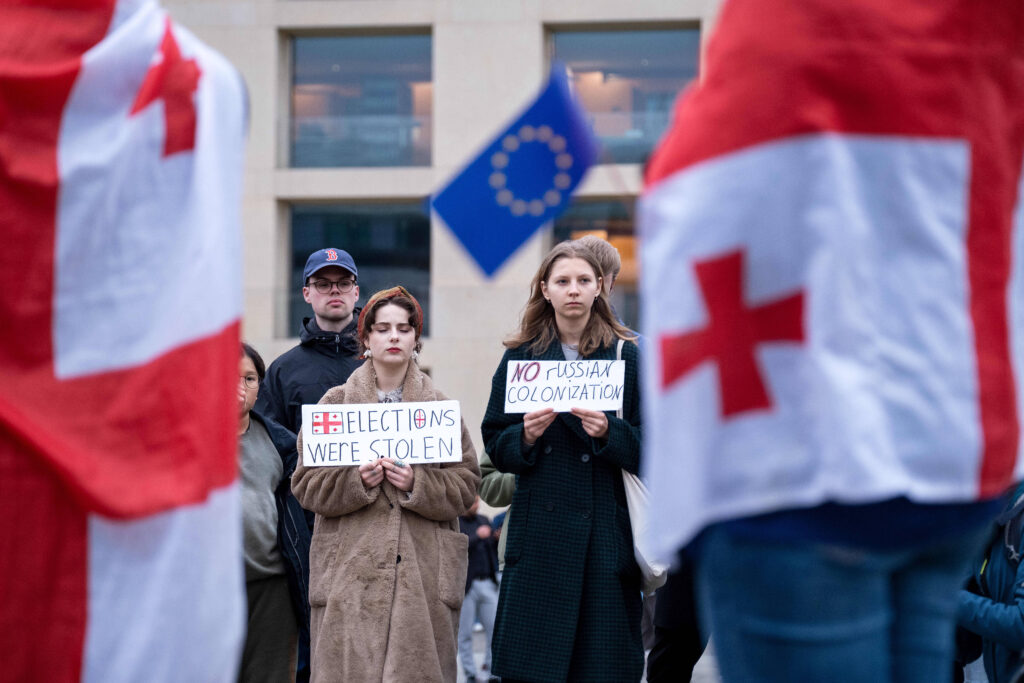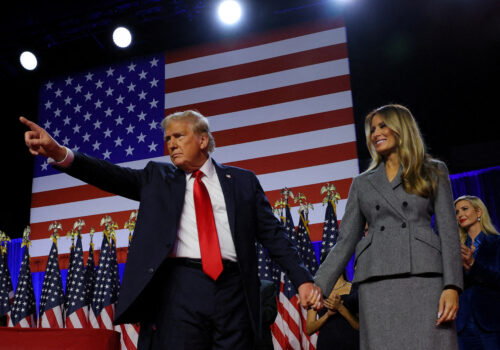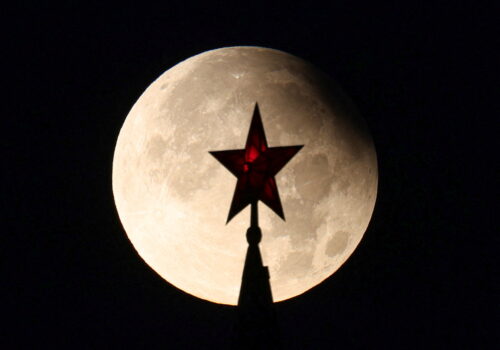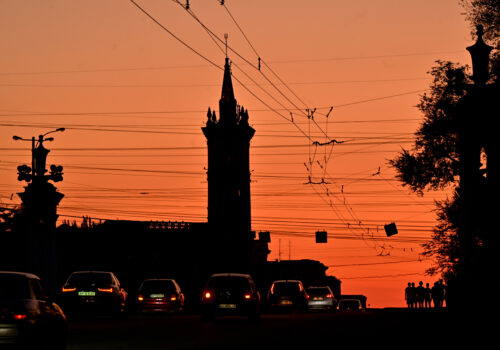A delegation of parliamentarians from France, Germany, Poland, Sweden, Finland, and the Baltic states arrived in Tbilisi on Monday as the fallout continued from Georgia’s disputed October 26 parliamentary elections. The European delegation was welcomed by opposition figures but was snubbed by representatives of the country’s Georgian Dream ruling party, who refused to meet the visiting EU politicians and accused them of “propagating lies” amid allegations of systematic election fraud.
This week’s awkward standoff in Tbilisi highlighted the ongoing geopolitical tensions sparked by Georgia’s controversial recent parliamentary vote. According to the country’s Central Election Committee, Georgian Dream was the clear winner with 54 percent of the vote. This outcome is questioned by opposition parties and election observers, who accuse the government of rigging the ballot.
Opponents led by Georgian President Salome Zurabishvili have claimed that the vote was flawed and have dismissed the official results as illegitimate. Zurabishvili branded the election a “Russian special operation,” a clear reference to the Kremlin’s preferred euphemism for Russia’s full-scale invasion of Ukraine. Three monitoring groups, including the OSCE, have backed allegations of election irregularities including vote-buying, multi-voting, and widespread Russian disinformation.
Stay updated
As the world watches the Russian invasion of Ukraine unfold, UkraineAlert delivers the best Atlantic Council expert insight and analysis on Ukraine twice a week directly to your inbox.
The election was widely seen as a referendum on Georgia’s future geopolitical direction. The country’s Russia-friendly authorities hoped to secure a mandate for a pro-Kremlin manifesto, while opponents sought to return Georgia to the path of Euro-Atlantic integration. This westward trajectory is certainly popular, with polls consistently indicating that around 80 percent of Georgians support the country’s bid for EU membership. At the same time, many have been alarmed by the Russian invasion of Ukraine and are fearful of facing the same fate if they attempt to turn away from Moscow.
The Georgian Dream party has been in power since 2012 and is officially committed to supporting European integration. However, party officials in Tbilisi have become increasingly critical of the West in recent years, and have faced mounting accusations of trying to steer the country back into the Kremlin orbit. Criticism has intensified following the adoption earlier this year of draconian laws similar to the authoritarian policies of Putin’s Russia. Critics say these legislative changes are aimed at silencing Georgia’s political opposition and muzzling the country’s civil society.
In the wake of the disputed election, Georgia’s pro-Western political forces have vowed to fight back against what they see as an attempt to undermine their country’s fledgling democracy. A number of large protest rallies have taken place in downtown Tbilisi since the late October ballot. Meanwhile, opposition parties are demanding fresh elections, refusing to serve in the new parliament, and calling on Georgia’s Western partners to conduct an international investigation into allegations of electoral misconduct.
Eurasia Center events

Russia has refrained from officially celebrating the election victory of its Georgian Dream allies. Instead, Moscow has accused the West of trying to “destabilize” Georgia with calls for an investigation into alleged violations. Nevertheless, there can be little doubt that the vote represents a significant geopolitical triumph for the Kremlin and a major setback for the West.
Critics of Georgia’s governing party fear the country may now follow the geopolitical trajectory of Belarus, which in recent years has become increasingly subject to creeping Russian control in every sphere of national life from the economy to defense. This would represent a significant turnaround for Russia, which had looked to be in danger of losing its traditional influence in the southern Caucasus region.
Russia invaded Georgia in 2008 and continues to occupy approximately 20 percent of the country. Bilateral relations between Moscow and Tbilisi have remained tense ever since this brief war sixteen years ago. However, while the Georgian public has overwhelmingly backed closer ties with the West, many have also spoken of the need to avoid a resumption of hostilities with Russia. Georgian Dream officials have sought to exploit these concerns over the possibility of a new Russian invasion. During the recent election campaign, the party ran a series of controversial adverts featuring images of wartime destruction in Ukraine along with appeals to “choose peace.”
Some observers believe Russia’s approach to Georgia may offer hints of the Kremlin’s ultimate intentions in Ukraine. After first invading and occupying a large portion of Georgian territory, Russia then helped engineer the election of a sympathetic government that has paid lip service to the country’s Euro-Atlantic aspirations while working toward mending fences with Moscow. This proved possible despite frequent evidence of intense anti-Russian sentiment throughout Georgian society. While such an outcome is extremely hard to imagine in today’s wartime Ukraine, the remarkable revival of Russian influence in Georgia could certainly serve as inspiration for Kremlin policymakers.
Protests look set to continue in Tbilisi. However, it is not clear whether anything can now be done to prove the allegations of election fraud or annul the results of the October vote. Georgia’s Western partners have voiced their concerns over the election but remain reluctant to withhold official recognition. Georgia will be on the agenda when EU foreign ministers meet next week in Brussels, but the European Union is not expected to take a stance on the legitimacy of the election. Instead, the most meaningful sanction will likely be the continued freezing of EU membership talks, which have been on pause since June 2024.
With Western leaders unwilling to confront the Kremlin in the Caucasus, Russia is the real winner of Georgia’s recent elections. The vote has demonstrated Moscow’s ability to overcome popular opposition by forging powerful alliances with local elites and ignoring international concerns over election interference. Russia will doubtless seek to apply the lessons learned in Georgia as it turns its attention to future election campaigns in front line countries like Moldova, and may also seek to adopt a similar approach to postwar Ukraine.
Nicholas Chkhaidze is a research fellow at the Baku-based Topchubashov Center.
Further reading
The views expressed in UkraineAlert are solely those of the authors and do not necessarily reflect the views of the Atlantic Council, its staff, or its supporters.

The Eurasia Center’s mission is to enhance transatlantic cooperation in promoting stability, democratic values and prosperity in Eurasia, from Eastern Europe and Turkey in the West to the Caucasus, Russia and Central Asia in the East.
Follow us on social media
and support our work
Image: IMAGO/snapshot via Reuters Connect




